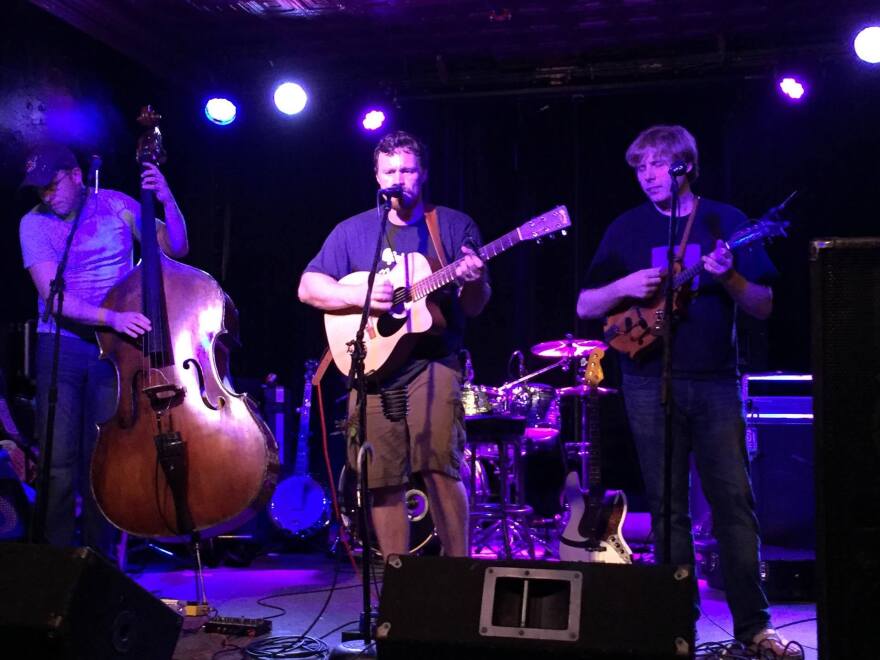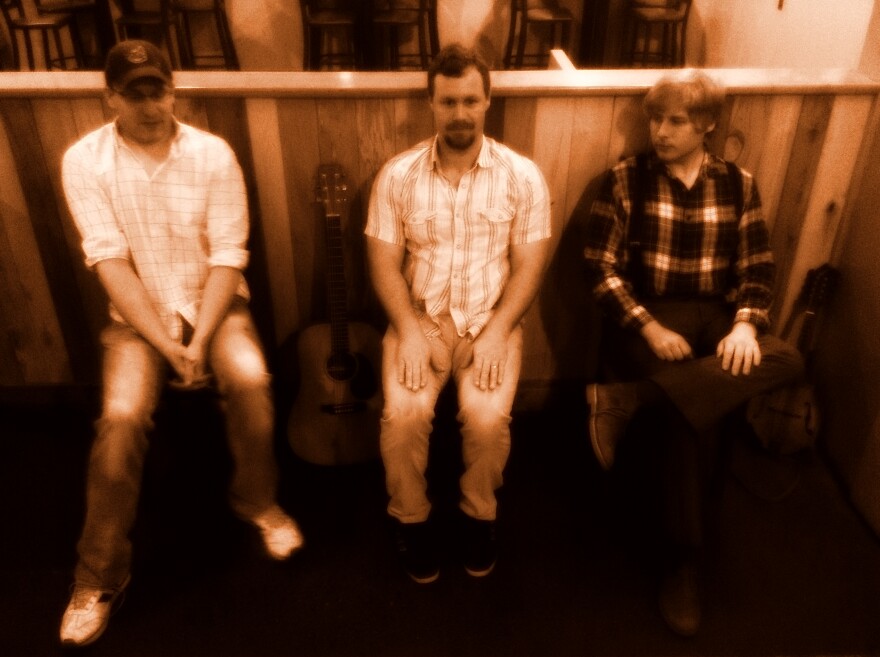W.Va. Biscuit Voted ‘South’s Best’
Tudor’s "Mountaineer” biscuit was named “The South’s Best Biscuit” in an online poll contest held by Garden & Gun, a southern lifestyle magazine.
Continue Reading Take Me to More News
Since the show began almost two years ago, A Change of Tune has highlighted some of the best up-and-coming artists out of these West Virginia hills with podcast-y chats ranging from The Sea The Sea to Coyotes in Boxes, Qiet to Bud Carroll and beyond.
But those interviews have been a bit infrequent, and since West Virginia Day is coming up (not to mention A Change of Tune’s second birthday), we thought we’d do something special: 30 days, 30 brand new #WVmusic interviews that range from Morgantown alt-rockers and Parkersburg singer-songwriters to West Virginia music venues and regional artist management and beyond, all of which contribute to this state’s wild and wonderful music scene.
And today, we are chatting with 18 Strings, a Morgantown-based string trio with an Appalachian twist (which they refer to as Appalachicana). So we asked the band…

How did 18 Strings start playing music together?
18 Strings started at the beginning of 2016. While the group is young in terms of band time, we’re all experienced and active members of the West Virginia music scene. In fact, Andy Tuck (vocals/guitar) had crossed paths with Chris Jones (mandolin/fiddle) long before 18 Strings began this past January. That was when Andy was performing a solo gig at Black Bear Burritos while Chris was eating (because the burritos there are delicious). Something grasped Chris to say, “Hey, why don’t we do a little something?” Chris wanted to get his mandolin back out, and that’s a good sign when he wants to get it out.
We wanted to do a stripped-down, acoustic string band type of thing. Chris and Greg Thurman (bass) were previously in a band called Whitewater, so Chris immediately called Greg to join our new endeavor. We got together at Chris’ kitchen table for our first band meeting, and we just clicked. It felt good from the get-go, really.
We all really like to play music in an original way while maintaining connections to tradition. If anything, 18 Strings was brought together by a mutual desire to explore the sonic possibilities of a string trio and to push those boundaries.
Where does the name 18 Strings come from?
The name of the group comes from the number of strings in the group — 6 on a guitar, 8 on a mandolin, 4 on a bass.
The name just jumped out. That was the one that everyone in the group perked up at. Andy was set on the name “John Work Three” after reading a book about Muddy Waters and learning that John Work III was the guy who initiated the first trip to Mississippi to record blues musicians. So “John Work Three” sounded cool to him, but no one in the band’s named John Work, so people would have been confused.
Chris was the one who finally said we should go with 18 Strings. Greg went along with that. And Andy was the one who suggested 18 Strings in the first place, so that was that.
John Bright down at The Purple Fiddle brought up a good point and say, “What happens if you get someone else in your band? Are you going to change the name?” And Andy said, “It will have to be 18 Strings etc.” If we were to add another instrument, it would probably be a second guitar.

What’s been the highlight of 18 Strings’ musical journey?
Opening up for Larry Keel at 123 Pleasant Street on April 15. Up until that point, we had done mostly small, intimate venues. But that was the first show where we had a sound guy and an audience that was larger than what we had played in front of before. Plus we got to watch Larry Keel for free, so that was a highlight, for sure.
What’s it like making music in West Virginia?
Making music in West Virginia is an amazing experience. The cultural backdrop is already so rich in tradition, and it’s a wonderful to be a musician in an ever-evolving scene.
With that said, Morgantown is a strange little world. Andy has been around Morgantown for 15 years and has watched the scene become a bit cliquey. Even though there are heavy metal groups, bluegrass groups, indie rock groups, and jam band groups, there are very few bands that weave in and out of those particular genre styles. Luckily 18 Strings can fit in with multiple styles since we do multiple styles of music.
There’s also a cyclical nature to Morgantown because an entire new population comes through every so many years because of West Virginia University. In terms of how we’re getting along in Morgantown, we’re still working on getting a solid fanbase.
Where does the band play around West Virginia?
We play at Black Bear Burritos a lot and 123 Pleasant Street in Morgantown. Even though Morgantown is our homebase, we’re not bound to Morgantown, by any means. The band’s been booked all over West Virginia, including Elkins, Parkersburg, Thomas, and Cleveland, West Virginia. We’ve also played in Pittsburgh and North Carolina. We’re just trying to get as many opportunities to play as we can right now.

Do you feel held back by being in West Virginia? Or does it feel like a musically-supportive place?
At times, West Virginia is very musically-supportive. The community that exists around the music can be very tight-knit.
With that said, if you’re just strictly talking about numbers in terms of places to play and people who come out to appreciate live music, one could say there’s a certain disadvantage to West Virginia’s music scene. If you take the city of Pittsburgh, for instance, there’s a million people in that metropolitan area. Whereas in West Virginia, there’s a million people in the entire state. If you take 10% of that million people who could be fans of your music, you would have a more concentrated fanbase in Pittsburgh compared to a less concentrated fanbase in West Virginia’s metropolitan areas.
This is where our music comes from. Our music is rooted here. But we can’t wait to go out and play in other areas so they can see that the music we represent, the Appalachian style of music, is being done in a new way.
You describe your music as Appalachicana. What does that term mean?
Chris came up with that name. What he was getting at is that we’re rooted in Appalachian musical styles, but we’re influenced by a lot of other American types of music, including acoustic classic rock songs like “Going to California” by Led Zeppelin and “Fearless” by Pink Floyd and artists like Bob Dylan, John Prine, Lead Belly, Creedence Clearwater Revival, Allman Brothers, and The Beatles. Appalachicana is geographical in location, but American music in scope.
What, in your opinion, needs to happen in the West Virginia music scene for it to move forward?
A Morgantown musician workshop would be great, where musicians who are interested in a larger scene could get together at a brew pub to cross-pollinate and be open to other styles. Most of the musicians that you talk to are into a wide range of music, but what they choose to do is focus on what the band is up to.
And there needs to be more promotion of West Virginia music. There’s a West Virginia Music Hall of Fame, and it’s great, but there needs to be more. It feels like there’s a cultural fence around West Virginia, and in order for the music scene in West Virginia to move forward, we need to kick down a couple walls and get out there. If you’re in Athens, Georgia and say, “I’m a musician,” then people will say, “Oh great! Where can I see you play?” Whereas in West Virginia, people would respond with, “Oh, how’s that working out for you?” I know West Virginia people love music, but it’s not taken seriously.
What advice would you give to anyone starting to make music?
The best thing to do is just to make music. Play with people at jam sessions, on your porch, in your garage, wherever. Just play with other people and learn how to collaborate and help each other learn. Because at the end of the day, playing music is supposed to be fun.
18 Strings’ self-titled debut will be out later this summer. Keep an eye on their social media for their music and tour dates. To hear more #WVmusic, tune in to A Change of Tune, airing Saturday nights at 10 on West Virginia Public Broadcasting. And for more #WVmusic chats, make sure to go to wvpublic.org/wvmusic and subscribe to our RSS / podcast feeds!